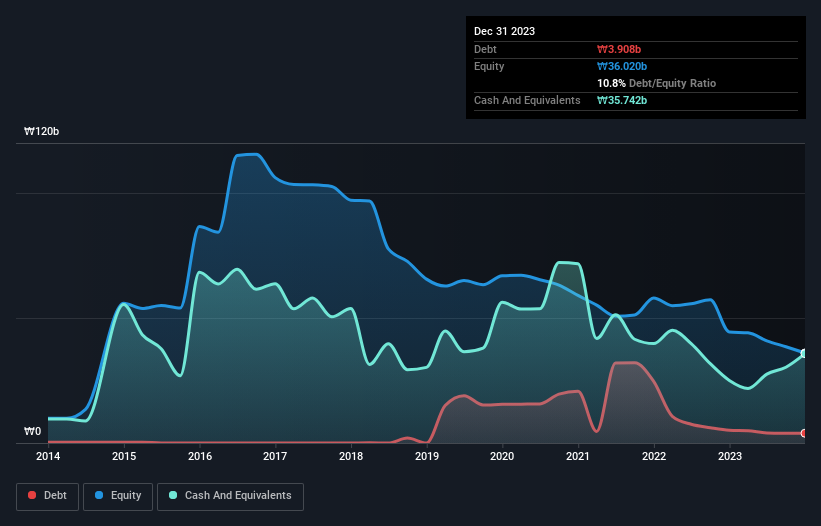- South Korea
- /
- Entertainment
- /
- KOSDAQ:A173940
Health Check: How Prudently Does FNC ENTERTAINMENT (KOSDAQ:173940) Use Debt?
Legendary fund manager Li Lu (who Charlie Munger backed) once said, 'The biggest investment risk is not the volatility of prices, but whether you will suffer a permanent loss of capital.' When we think about how risky a company is, we always like to look at its use of debt, since debt overload can lead to ruin. We note that FNC ENTERTAINMENT Co., Ltd. (KOSDAQ:173940) does have debt on its balance sheet. But the more important question is: how much risk is that debt creating?
When Is Debt Dangerous?
Debt is a tool to help businesses grow, but if a business is incapable of paying off its lenders, then it exists at their mercy. If things get really bad, the lenders can take control of the business. While that is not too common, we often do see indebted companies permanently diluting shareholders because lenders force them to raise capital at a distressed price. Of course, plenty of companies use debt to fund growth, without any negative consequences. When we think about a company's use of debt, we first look at cash and debt together.
See our latest analysis for FNC ENTERTAINMENT
How Much Debt Does FNC ENTERTAINMENT Carry?
As you can see below, FNC ENTERTAINMENT had ₩3.91b of debt at December 2023, down from ₩5.10b a year prior. But on the other hand it also has ₩35.7b in cash, leading to a ₩31.8b net cash position.

How Healthy Is FNC ENTERTAINMENT's Balance Sheet?
According to the last reported balance sheet, FNC ENTERTAINMENT had liabilities of ₩33.1b due within 12 months, and liabilities of ₩42.7b due beyond 12 months. Offsetting this, it had ₩35.7b in cash and ₩6.38b in receivables that were due within 12 months. So its liabilities total ₩33.7b more than the combination of its cash and short-term receivables.
FNC ENTERTAINMENT has a market capitalization of ₩62.5b, so it could very likely raise cash to ameliorate its balance sheet, if the need arose. However, it is still worthwhile taking a close look at its ability to pay off debt. Despite its noteworthy liabilities, FNC ENTERTAINMENT boasts net cash, so it's fair to say it does not have a heavy debt load! The balance sheet is clearly the area to focus on when you are analysing debt. But it is FNC ENTERTAINMENT's earnings that will influence how the balance sheet holds up in the future. So when considering debt, it's definitely worth looking at the earnings trend. Click here for an interactive snapshot.
Over 12 months, FNC ENTERTAINMENT reported revenue of ₩92b, which is a gain of 40%, although it did not report any earnings before interest and tax. With any luck the company will be able to grow its way to profitability.
So How Risky Is FNC ENTERTAINMENT?
Although FNC ENTERTAINMENT had an earnings before interest and tax (EBIT) loss over the last twelve months, it generated positive free cash flow of ₩13b. So although it is loss-making, it doesn't seem to have too much near-term balance sheet risk, keeping in mind the net cash. One positive is that FNC ENTERTAINMENT is growing revenue apace, which makes it easier to sell a growth story and raise capital if need be. But we still think it's somewhat risky. When analysing debt levels, the balance sheet is the obvious place to start. But ultimately, every company can contain risks that exist outside of the balance sheet. Case in point: We've spotted 2 warning signs for FNC ENTERTAINMENT you should be aware of, and 1 of them shouldn't be ignored.
Of course, if you're the type of investor who prefers buying stocks without the burden of debt, then don't hesitate to discover our exclusive list of net cash growth stocks, today.
New: AI Stock Screener & Alerts
Our new AI Stock Screener scans the market every day to uncover opportunities.
• Dividend Powerhouses (3%+ Yield)
• Undervalued Small Caps with Insider Buying
• High growth Tech and AI Companies
Or build your own from over 50 metrics.
Have feedback on this article? Concerned about the content? Get in touch with us directly. Alternatively, email editorial-team (at) simplywallst.com.
This article by Simply Wall St is general in nature. We provide commentary based on historical data and analyst forecasts only using an unbiased methodology and our articles are not intended to be financial advice. It does not constitute a recommendation to buy or sell any stock, and does not take account of your objectives, or your financial situation. We aim to bring you long-term focused analysis driven by fundamental data. Note that our analysis may not factor in the latest price-sensitive company announcements or qualitative material. Simply Wall St has no position in any stocks mentioned.
About KOSDAQ:A173940
Adequate balance sheet and slightly overvalued.
Market Insights
Community Narratives



